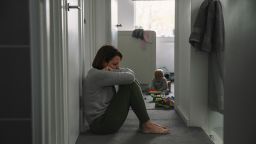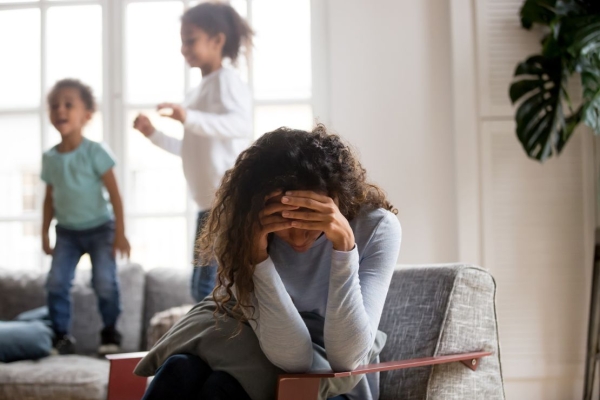
Sign up for CNN’s Stress, But Less newsletter. Our six-part mindfulness guide will inform and inspire you to reduce stress while learning how to harness it.
When I was knee-deep in the early years of parenting, Facebook was in its infancy and Instagram and TikTok weren’t even on the horizon. I was stuck in the revolving door of work and parenting, and nothing about my personal life was Instagram-worthy. Dishes piled up, laundry was rarely folded, and Whole Foods did a fair amount of the cooking for me. And none of my life was online.
Somewhere between 2006 and now, parenting became a crash course in achievement, with social media grading us at every turn. With perceived perfection as the end goal, as measured by child success, and pictures to prove it cross-posted on Facebook and Instagram, kids and parents alike unknowingly entered a relentless pressure cooker.

mother sitting on landing floor whilst her baby plays in the background Justin Paget/Digital Vision/Getty Images
“Parental achievement culture, and the chronic stress that comes with it, is real, if only because the resulting anxiety and churning stomach juices is real,” said Jessica Lahey, author of “The Gift of Failure.” “However, much of that stress comes from us, from the media we consume, the parents we hang out with and the childhood milestones we focus on, and it can really warp our thinking.”
The nature of childhood changed as parents did their best to ensure that their kids were front-loaded with everything they needed to succeed in childhood. Free play was replaced with adult-directed activities and story time was swapped for reading practice. Even preschoolers became mini-achievers, with their early reading success a marker of exceptional parenting.

Children and parents alike have unknowingly entered a relentless pressure cooker under the constant spotlight of social media. fizkes/iStockphoto/Getty Images
It was a recipe for burnout.
It’s no surprise to me that researchers at the Ohio State University College of Nursing confirmed that parents are, indeed, facing burnout. In a 2023 survey of more than 700 parents nationwide, 57% of parents self-reported burnout.
Parent burnout is strongly associated with both internal and external expectations. These include whether a person feels like a good parent, perceived judgment from others, whether they have enough time to play with their children, their relationship with their spouse, and keeping a clean house.

Cropped shot of a mother comforting her little son at home laflor/iStockphoto/Getty Images
I could live in a house littered with toys and unfolded clothes and throw a pizza on the table when work ran late without an online spotlight, but parents of young children today face impossible expectations. They have to work, create perfect learning conditions for child success, play with their children (but make sure the play involves education), cook organic everything from scratch on the daily, and make sure to update the sizzle reel often.
One other concerning finding from the survey is that parents of children with mental health disorders reported higher levels of burnout and a greater likelihood of using harsh parenting practices, including insulting, criticizing, screaming at, cursing at and/or physically harming their children. These can result in a cycle of increased mental health issues for both the parent and the child.
The researchers suggest engaging in positive parenting practices, including setting realistic and clear expectations, creating healthy boundaries and following predictable routines. Those are great starting points, especially for parents with young children, but there are other steps you can take as well:
Monitor your social media use
Social media has some benefits: It keeps us all connected, it’s fun, and it’s a healthy escape in small doses. But it also has downsides. Comparison culture is fueled by endless scrolling, we don’t always see the story beneath the story, and frequent use can correlate to feelings of low self-esteem.
There are two social media tricks that can be life-changing for adults: Mute accounts (you’re the only one who will know!) that leave you feeling stressed and set a time limit using your phone settings. You’re better off binging your favorite show on Netflix than jealous-scrolling and feeling defeated as a result.

Alliance/Adobe Stock
Embrace ‘good enough’
While perfection across contexts has long been a norm in our society, we would do well to tap into the work of Dr. Donald Winnicott. The pediatrician made a splash in the field of parenting in the 1950s when he introduced the concept of “the good enough mother.” Noting that perfectionism is often counterproductive, Winnicott cautioned that no child seeks perfection from parents; they simply seek connection, physical needs and emotional safety.
I suggest updating that language to “the good enough caregiver,” but otherwise the principles hold up. To attempt perfection in child-rearing is to set kids up for a lifetime of stress and disappointment. Human beings are not perfect. Rather, doing our best on any given day is a far more realistic portrayal of how the world works.

According to a new study, disrupted sleep in parents and disrupted sleep in their children are each correlated with increased stress in the parents Justin Paget/Digital Vision/Getty Images
Reframe your thinking
Lahey suggests stepping back from monitoring for signs of perceived achievement. “Our kids need to know we love them no matter what grade, point or score they bring home,” she said. “Our children are more than the sum of their accomplishments and we — their parents — are not measured by those things either.”
Lahey cautions parents to remember that parenting is a long-haul job with peaks and valleys and that kids can and do learn from their mistakes along the way.

Rouzes/iStockphoto/Getty Images
Quit the competition
One thing that will always remain true is that all children learn and grow at their own developmental paces. Milestones are simply goalposts to monitor for the extremes, but they are flexible. No two children are the same.
You have the choice to step back, decrease the classes, sports and other activities you feel are essential because of external expectations, and find the right pace for your family. I often encourage parents to use a whiteboard calendar to write down every single thing they have to do in a week and then step back and remove at least two things. Small changes can reap big rewards, including decreased parental stress and burnout.
You can quit the competition, and your kids will be better for it.
Dr. Katie Hurley is the senior clinical advisor for The Jed Foundation, a child and adolescent psychotherapist, and the author of several books, including “No More Mean Girls: The Secret to Raising Strong, Confident, and Compassionate Girls” and the forthcoming “Fiona McPhee, Please Listen to Me!”

